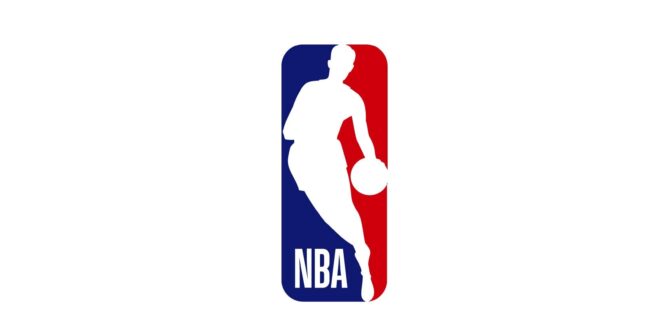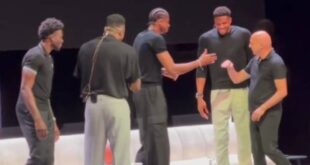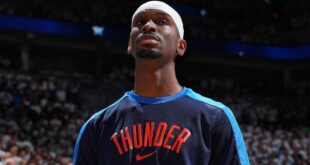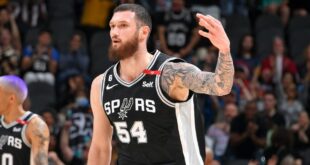MINNEAPOLIS – Forget the peculiar phenomenon of road teams thriving in the Eastern Conference; the focus turned to Oklahoma City and Minnesota Timberwolves, who managed to restore some semblance of order in the Western Conference after the homecourt turmoil experienced at the start of this round.
The Timberwolves’ 117-93 triumph over the Golden State Warriors on Thursday at Target Center may not have been as extreme as Oklahoma City’s dismantling of Denver the previous night, but it accomplished the same objective, leveling the conference semifinals series at 1-1 as the matchup shifted locations.
In fact, Minnesota was in a slightly more precarious position compared to the Thunder. Had the Wolves faltered against the Warriors—especially with Stephen Curry sidelined due to a hamstring injury that cut short his Game 1 appearance—longtime supporters would have felt the sting of a grim consequence.
Fortunately, that scenario didn’t materialize (avoiding a potentially embarrassing repeat of former player Jimmy Butler’s infamous antics during his tenure with the franchise back in 2018).
Here are five key observations from a game that Minnesota could not afford to lose, as the series transitions to San Francisco, with Game 3 set for Saturday at 8:30 p.m. ET on ABC.
The urgency has escalated rapidly in this series. Coaching staffs began appealing to officials for calls after just one game, and the Timberwolves already sensed the pressure to win during Game 2.
Kudos to the Wolves for rising to the occasion. They started the game strong, scoring the first 13 points and establishing a commanding 20-5 lead deep into the first quarter. They even restricted Golden State to a poor shooting percentage of 2-for-12 (1-for-8 from beyond the arc) and 0-for-2 from the free-throw line at that moment.
Playing without Curry is akin to having a meal without vegetables—they just don’t taste right.
Minnesota maintained control throughout the game, extending their lead to 22 points in the second quarter and as much as 25 toward the end. Julius Randle stood out as the team’s cornerstone, contributing 24 points, seven rebounds, and 11 assists, while Jaden McDaniels excelled defensively, limiting Butler to just 17 points on a night when the Warriors desperately needed more from their playoff ace. McDaniels added 16 points, along with three steals and three blocks.
The Wolves experienced a dip in performance during the third quarter, getting careless with the basketball as their lead shrunk to 62-55 at the 6:57 mark. However, a couple of three-pointers and the Warriors’ inconsistent scoring helped Minnesota regain a double-digit advantage.
Curry’s hamstring injury has had a ripple effect on Golden State’s lineup, and the Timberwolves capitalized on it in Game 2.
Losing Curry is like unravelling a finely knitted sweater; things can quickly fall apart. He is the central figure in Golden State’s offense, and managing his typical in-game rest is already complex enough. A prolonged absence due to his injury, expected to last at least a week, complicates matters greatly.
“Part of our game plan was to utilize a lot of players, and we did,” Coach Steve Kerr stated. “We need to assess how we can navigate this series without Steph. We gave many players opportunities, and some truly rose to the occasion.”
Among those who did were Jonathan Kuminga and Trayce Jackson-Davis. Jackson-Davis, a lesser-used reserve, made all six of his attempts, fortified the defense, and finished with 15 points. Kuminga, just 22, has long been viewed as a key asset for Golden State’s future. After falling out of the rotation in April, Kuminga stepped back up and led the team with 18 points off the bench.
“We need to evaluate our rotations and starting lineup, but they’ll definitely play a role moving forward,” Kerr remarked after experimenting with his roster. “We must discover more effective scoring methods.”
As the first half wore on, there were moments when it seemed the series might devolve into a strategic standoff—each side losing critical pieces. Midway through the second quarter, Anthony Edwards hit the hardwood and had his left ankle stepped on by Jackson-Davis.
While the play continued at the opposite end, Edwards remained down. Coach Chris Finch called a timeout, and the star guard had to be assisted to the locker room, where he remained until halftime.
“I was genuinely concerned,” Finch said about Edwards’ ability to rapidly recover from injuries. “I’d already prepared myself for the possibility that we wouldn’t see him for the rest of the game.”
However, Edwards made a return, albeit looking unsteady at first. He managed to score 10 points in the fourth quarter. It wasn’t the explosive performance fans anticipated, but he was moving well enough. With 48 hours for treatment before Game 3, it’s worth noting he is a young and resilient 23-year-old.
“One thing about Ant is he’s not going to sit out,” teammate Nickeil Alexander-Walker noted. “He’s got to be nearly incapacitated to miss a game.”
Meanwhile, Warriors center Draymond Green finds himself on the brink of potential suspension, having accrued yet another technical foul with 8:46 remaining in the second quarter.
Having possession with Minnesota’s Naz Reid closely guarding him from behind, Green was fouled in a manner that unintentionally struck Reid in the head.
The referee’s decision: foul on Reid, technical foul on Green for excessive actions. Green erupted in frustration, but the game carried on, and now he stands just two technical fouls away from a one-game suspension.
“He needs to tread carefully now. We require him,” Kerr emphasized.
Following Game 1, the Timberwolves had set an NBA record for the lowest 3-point shooting accuracy. Their combined 7-for-47 performance in their previous game against the Lakers and a dismal 5-for-29 in Game 1 led to an astonishing 12-for-76, equating to only 15.7%.
In Game 2, however, through improved shot selection and spacing, they attempted 37 shots and converted 16 for an impressive 43.2%. Although their playoff average stands at 32.1%, they still need to improve significantly to reach their regular-season rate of 37.7%, which ranked fourth in the league.
* * *
Steve Aschburner has been covering the NBA since 1980. You can reach him via email here, find his archives here, and follow him on X.
The perspectives shared on this page may not necessarily represent those of the NBA, its teams, or Warner Bros. Discovery.
 NBA News NBA News, Match Reports and Updates
NBA News NBA News, Match Reports and Updates



